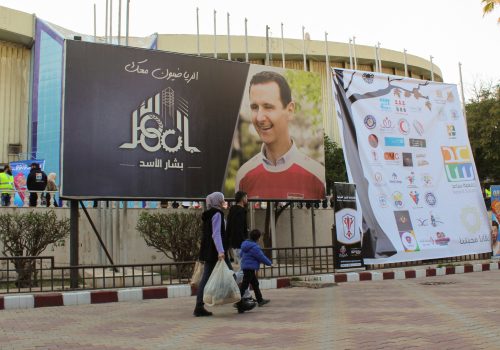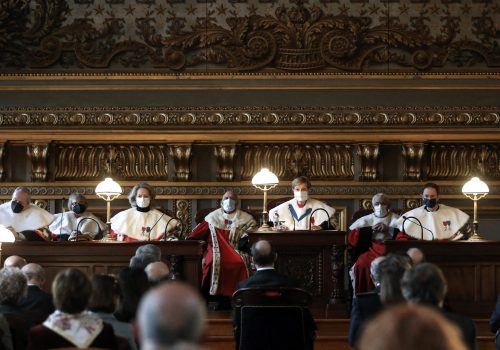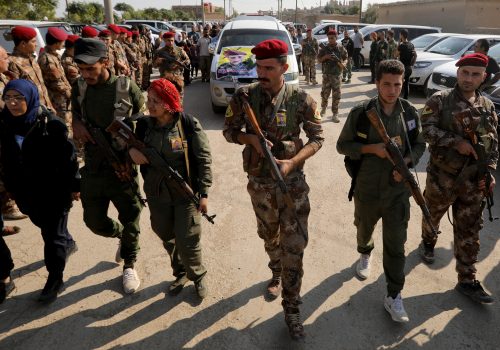It’s been over a decade since Ankara and Damascus talked. What changed?
After eleven years, an official meeting on the ministerial level occurred between Ankara and Damascus. The December 2022 meeting in Russia is the first of many that may ultimately result in a direct encounter between Recep Tayyip Erdogan and Bashar al-Assad. So, how has Turkey changed its policy so drastically?
For months, the public and analysts have speculated about a new Turkish-Syrian military operation against the Syrian Democratic Forces in Syria, which are the local US-supported force dominated by the People’s Protection Units (YPG)—the Syrian branch of the Turkish Kurdistan Workers’ Party (PKK) and a designated terrorist organization by Turkey and the United States. Speculation increased after the November 2022 bombing on Istiklal Street in Istanbul—in which evidence pointed towards the YPG—especially as Turkey launched Operation Claw-Sword and bombarded several positions in Syria and Iraq, which were perceived as preparation for a ground assault.
However, this operation did not occur. Following the strikes, the Assad regime strengthened its military presence in YPG-held areas and Russia demonstrated that it would not bow to Turkish demands despite being preoccupied with Ukraine. After rounds of talk between Ankara and Moscow, Russian President Vladimir Putin convinced Erdogan to talk with Damascus. Initially, the Turkish intelligence chief met with his Syrian counterpart. Later on, the first meeting on the ministerial level was held in December 2022 in Moscow, with Turkish Defense Minister Hulusi Akar meeting Ali Mahmoud Abbas, the Syrian Defense Minister. Soon after, the Turkish foreign minister announced that a second meeting on the ministerial level between the foreign ministers would be held in the second half of January.
It is expected that Russia and the United Arab Emirates will also participate with their respective foreign ministers. Furthermore, the Turkish president stated that a meeting with Assad could be held soon. However, indicating that disagreements persist, the Turkish Foreign Minister later announced that the meeting will be held in early February between Ankara, Damascus, and Moscow.
Although direct talks between Ankara and Damascus have been an old and robust Russian demand, the circumstances motivating Turkey’s decision-making has changed significantly since then. For example, the myth that the Assad regime can deliver on two top Turkish demands, namely the return of refugees and the eradication of the YPG, has made its rounds in Turkey. Over the years, the Turkish opposition—by constantly repeating their claims like a mantra—managed to convince public opinion in Turkey. According to a poll conducted by Metropoll in December 2022, 59 percent of Turks support reconciliation with the Assad regime, while only 29 percent reject reconciliation. The Turkish president needs to pay attention to public sentiment ahead of the presidential and parliamentary elections to be held on May 14. In contrast to international perception, Turkey remains the most important democracy of a Muslim-majority country in which elections matter.
Nevertheless, it’s not just the public that buys into this narrative, as the Turkish bureaucracy and many Turkish researchers believe that reconciling with Assad can result in a meaningful resolution for their country.
Projects declared by the Turkish government that facilitate the voluntary return of refugees to Turkish-protected areas of Syria did not convince the Turkish public. The pace of return, as well as the question over the source of financing for new housing and infrastructure projects, hindered the ruling party from recovering electorate support.
As the Syrian refugee issue remains one of the two most essential election topics, the Turkish ruling party has no option but to accept Russian demands and mediation and reach out to Damascus to guarantee a win in the elections. In an atmosphere where all Turkish opposition parties claim that they will resolve the refugee issue by normalizing with the Assad regime, this move takes away the main argument of the Turkish opposition.
This is a decision based on domestic political considerations, but it is also one in which the Assad regime only stands to win while Turkey could lose much. The experience of Jordan and Lebanon shows that reconciling with the Assad regime does not facilitate the return of refugees. However, a picture of Erdogan and Assad will substantially impact the Syrian opposition, which has been depending on Turkish political support as international support and interest has diminished over the years. Furthermore, the number of Syrians living in Turkey and Turkish-protected areas of Syria is more than that of Syrians in regime-held Syria. Syrians have been organizing demonstrations in which they made their rejection very clear. In contrast, even if there is no agreement with Turkey, Assad will gain more international legitimacy as the most important supporter of the Syrian opposition directly engages with his regime.
When it comes to the issue of the YPG, Turkey has tried to resolve its national security needs by launching military operations in northern Syria since 2016. However, since 2019, Russia has managed to thwart all Turkish attempts. In 2021, the United States opened the airspace in eastern Syria to Russia, and Russian fighter jets and military personnel deployed in YPG-held areas blocked Turkey from launching the operation. At the same time, Turkey remains under the threat of US sanctions if it were to launch a military operation against the YPG-held regions in northern Syria under US Executive Order 13894, which was issued by President Donald Trump in 2019.
The combination of Russian opposition, the American sanctions threat, and upcoming elections prevented Turkey from pursuing a military operation to address its security needs. Simultaneously, the Turkish opposition successfully advocated for the idea of reaching a deal with the Assad regime to coordinate against the YPG. The current talks with the Assad regime are a result of this win.
The victory of the Turkish opposition in the public discourse over refugees and the YPG seems to be the main reason for this Turkish policy change on Syria. However, this shift is also driven by the lack of European support for Turkey and the US’s inability to develop a Syria roadmap that accommodates Turkish security needs while continuing the fight against the Islamic State of Iraq and al-Sham (ISIS).
For years, Turkey somehow hoped that the European Union (EU) would aid Turkey in dealing with the refugee issue. The refugee deal between Turkey and the EU can be marked as the date when public sentiment in Turkey changed against Syrian refugees. Turks felt exploited and used by the Europeans, as the EU never implemented essential aspects of the deal, such as visa regulations and the procedure to accept Syrian refugees into Europe. The EU believed that only fulfilling the obligation to provide financial aid could resolve the refugee issue.
When the funds were used up, the EU held a meeting and agreed to provide more. Speaking for itself, the EU did not invite Turkey to discuss the continuation of the refugee deal. And when Turkey understood that the route to Europe for refugees was closed, it decided to facilitate the return to Syria and hoped for European financing. However, the Europeans rejected it.
Secondly, the Turks always hoped that the US would someday abandon the YPG-dominated Syrian Democratic Forces in favor of the Syrian opposition. Turkish politicians repeatedly and regularly called on the United States to change policies in Syria to no avail. The United States, for its part, had no plan or endgame for Syria. US officials articulated policy tools, like sanctioning the Assad regime, as policy goals and repeatedly underlined that they understood Turkish concerns. However, the US neither came up with a way to address them nor listened to the Turks.
In conclusion, the unwillingness of the European Union and the United States to deliver and introduce a solid plan that addresses Turkish needs is the real reason why Ankara is taking such a high risk by speaking to Damascus and following a path that will likely fail. To present an alternative, the US should introduce a serious roadmap that combines the Turkish and American spheres of influence, addresses Turkish security concerns by severing relations with the YPG for a Turkey-friendly local partner, and continues to focus on the fight against ISIS.
Ömer Özkizilcik is a foreign policy and security analyst based in Ankara. Follow him on Twitter: @OmerOzkizilcik.
Further reading
Fri, Jan 13, 2023
US sanctions on Syria aren’t working. It’s time for a new sanctions approach that minimizes humanitarian suffering and increases leverage.
MENASource By
Before making concessions, the United States can increase its leverage in Syria by dedicating resources to make use of the smart sanctions that US policymakers have already developed.
Thu, Feb 10, 2022
A perpetrator of Syrian crimes against humanity went free in France. Here’s why it shouldn’t happen again
MENASource By Michel Duclos
If the scope for changing the course of events in Syria is limited, it’s honorable to take a stand against the abominable crimes of the Bashar al-Assad regime. It would be a great pity for France to be seen as a safe haven for Assad’s accomplices.
Mon, Mar 23, 2020
Amid US uncertainty in Syria, Kurdish YPG eyes bolstering ties with Russia
MENASource By
The YPG leadership is said to be reassessing the strategic importance of its ties with what is an increasingly unreliable Washington, and is looking to further diversify its portfolio of international partners, with an eye toward strengthening ties with Russia.
Image: Turkey-backed Syrian rebel fighter stands near a former YPG office at the entrance of Tel Abyad, Syria, October 14, 2019. REUTERS/Khalil Ashawi


